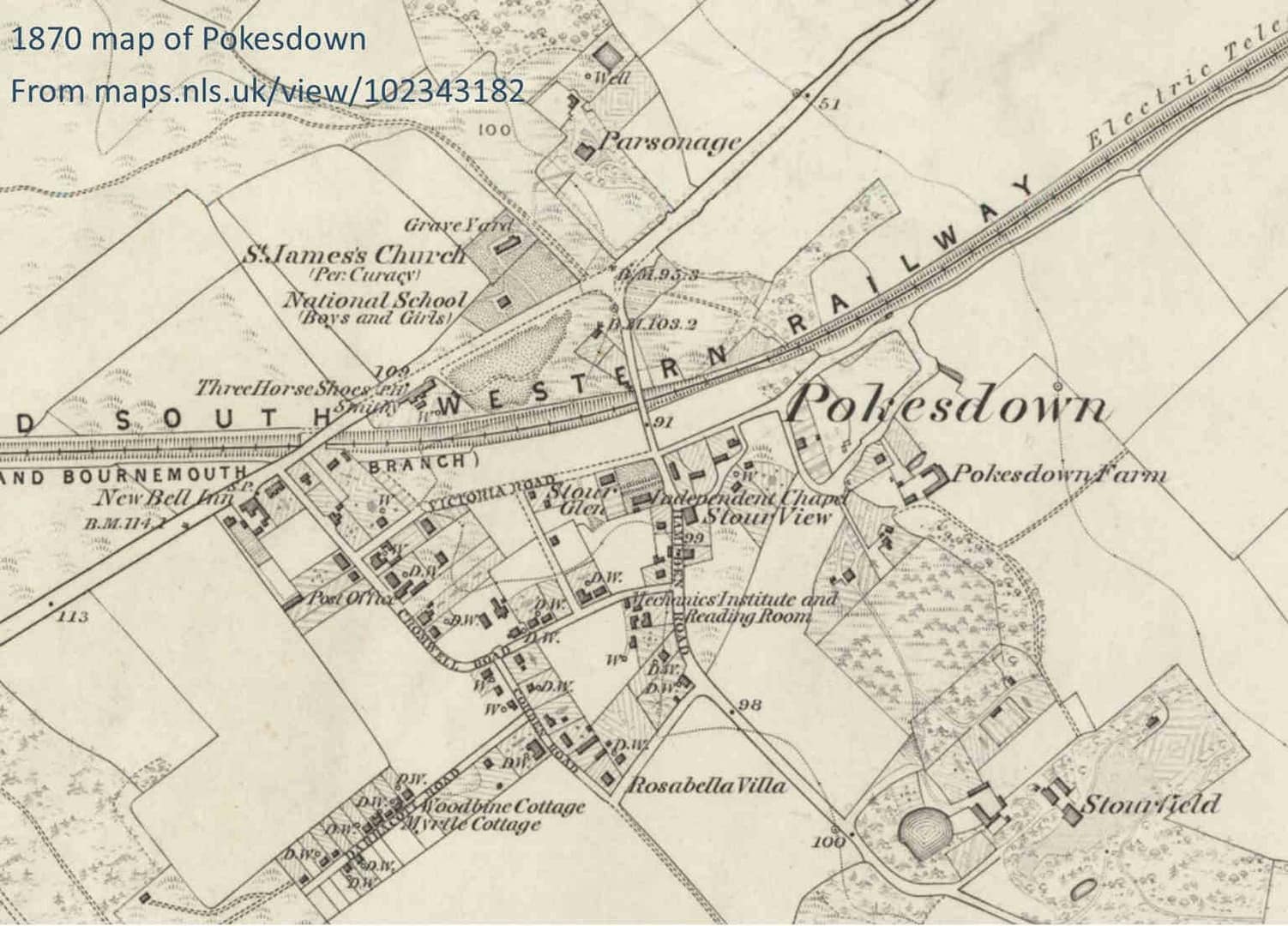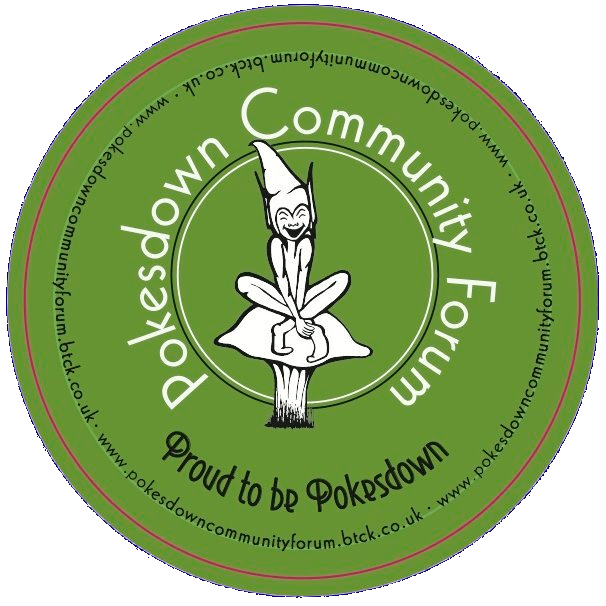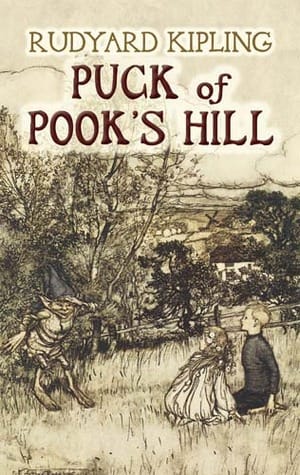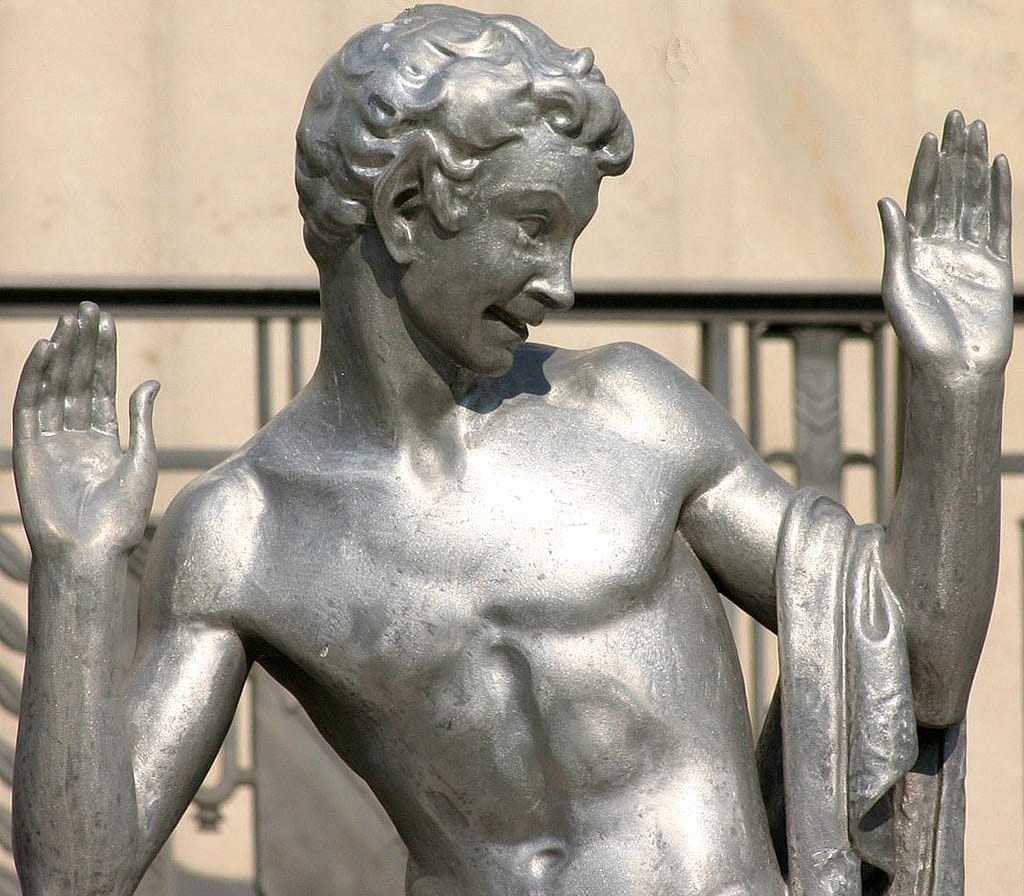Earliest known written records with the name “Pokesdown”:

Year: c.1586. Evidence: Richard Morris of Pokesdown, Christchurch on a list of people fined for buying pirates’ goods (part of The Cecil Papers).124d
Year: 1660. Evidence: Henry Mantle of Pokesdown elected a churchwarden of Christchurch Priory.
Year: 1662-63. Evidence: churchwarden accounts record the receipt of one shilling from Henry Mantle of Pokesdown in payment “for a place for his wife where his mother did sit”.125
Year: 1734. Evidence: Christchurch Poor Rate Book, includes the line “The Lady’s Mews for Bugby’s at Pokesdown“.126
Year: 1800. Evidence: the will of Mary Eleanor Bowes, Countess of Strathmore and Kinghorne, Stourfield House – she left an annuity for the Widow Lockyer of Pokesdown Farm.127
1870 map of Pokesdown showing earliest recorded settlements of Pokesdown Farm (date unknown, but pre-dates Stourfield House) and Stourfield House (est. c.1766). See Sources note 128.
Where did Pokesdown get its name from?

(designed by ‘Definitely Mary’)
There is no definitive answer about the origins of the name “Pokesdown”, but the different theories are:
- It might be a corruption of ‘Peaksdown’ – ‘Peak’ – a high point in the downs (‘down’ meaning low hills covered in grass);129
- It may have been a persons name associated with the down – ‘Pocs’ Down’, or the Old English surname ‘Puca’, as in ‘Puca’s Down’ has morphed into ‘Pook’ in Middle English, as in ‘Pook’s Down’;130 or if derived from the Saxon personal name “Pok” or “Pokok” then Pokesdown would mean “the hill of the Pok family”;130a
- It could be from ‘Pooks Down’ where ‘pooks’ is the local dialect word for ‘haycock’ (cone shaped pile of hay). But Coates says “the 13th century with a medial ‘-s-‘ speaks against this”;131
- It’s from ‘Pig’s Down’, from the days when people were allowed to keep pigs at will, before it was banned as part of the urbanisation;131a
- It was an area for “poor souls stricken with the pox” = “Poxdown” (but I haven’t found any corroborating evidence);131b
- The most popular (if unsubstantiated) theory is that Pook’s (or Puck’s) Down was referring to the fairies or pixies or goblins living on the downs! ‘Pook’s Down’ is Middle English for ‘Goblin’s Hill’.132
The fact that the “pig theory” is only in the newspapers and isn’t in any of the history books makes me think, either (a) it’s a theory made up by residents with local knowledge, but rejected by the academics, who are carefully analysing the etymology (the study of the origin and history of words); or (b) the academics were studying the name “Pokesdown” fifty-years-plus after the locals who could remember pig keeping at Pokesdown had passed, but years before the British Newspaper Archive was online with a searchable database of newspapers reporting on Bournemouth life, and therefore missed this titbit.
The theory about “Pox-down” comes from the Holdenhurst Village History website, which says “It is recorded that there was a Leper Hospital in Christchurch, the owners of which owned land and a cottage at Holdenhurst during the reign of Edward III [1312-1377] – it is thought that centuries ago poor souls stricken with the ‘pox’ were brought from ‘Poxdown’ (Pokesdown) for treatment at the then named ‘Hospice of St Mary Magdalen'”. But I have been unable to find the source of this theory, or any corroborating evidence, and it’s not mentioned in the history books. If you know of any information backing this theory, let us know!
Pooka, Puck and Pixies…
When it comes to the favourite theory, Your Irish Culture explains:133
The meaning of Pooka, pronounced poo-ka, is from the old Irish word ‘púca’, which means ‘goblin’. There are many variations of the spelling Pooka including Púca, Plica, Phuca, Pwwka, Puka, and Pookha all of which are totally acceptable. It is possible that the origin of the word Pooka may come from the Scandinavian word, Pook or Puke meaning ‘nature spirit’… A Pooka is a shapeshifter and can take any form it chooses. Usually, it is seen in the form of a horse, dog, rabbit, goat, goblin, or even an old man.
The Pooka has been imagined in cinema as the large rabbit-type creature, called Harvey, in the 1950 James Stewart film, and a far more disturbing rabbit-type creature in the 2001 Jake Gyllenhaal film, Donnie Darko!
But, going by the newspaper articles which discuss the name “Pokesdown”, where there are references to folklore or mythological creatures, it’s not giant, scary, malevolent rabbits (Pookas) that people are imagining, but rather, “Puck” and his fairies!
Tracing the etymology or folklore wandering path(s) that led from “pooka” to “puck”, the Encyclopedia Britannica says of “Puck”:
Puck, in medieval English folklore, a malicious fairy or demon. In Old and Middle English the word meant simply “demon.” In Elizabethan lore he was a mischievous, brownielike fairy also called Robin Goodfellow, or Hobgoblin. As one of the leading characters in William Shakespeare’s Midsummer Night’s Dream, Puck boasts of his pranks of changing shapes, misleading travelers at night, spoiling milk, frightening young girls, and tripping venerable old dames. The Irish pooka, or púca, and the Welsh pwcca are similar household spirits.134

Published in 1906. Source: Good Reads.

The copy and paste citation for this page:
The History of Rosebery Park Baptist Church and Pokesdown – Pokesdown: the name, Page 1. Author: Michelle Fogg. Date: May 2022. Url: https://roseberypark.org/history/pokesdown-the-name-1/
Sources of Information for The History of Rosebery Park and Pokesdown (opens in new tab)
Go To About Us
Go to Other Activities
Rosebery Park Baptist Church, 812-814 Christchurch Road, between Boscombe and Pokesdown, Bournemouth, BH7 6DF
